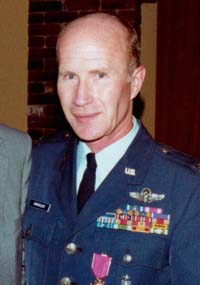 |
 |
| current issue |  | past issues |  | send a letter/news |  | address update |  | advertise |  | about us |  | alumni home |
In Memoriam
|
Richard W. Burkholder '48
Nerves of steel, and a quirky sense of humor By Karen Hammond '64 |
|
 If you asked him what time it was, he would give you the history of watches," recalls Richard Burkholder's daughter, Peggy Burkholder Hustvedt '72. "When I asked him a question, I learned to add, 'Please give me the answer in 25 words or less.'"
If you asked him what time it was, he would give you the history of watches," recalls Richard Burkholder's daughter, Peggy Burkholder Hustvedt '72. "When I asked him a question, I learned to add, 'Please give me the answer in 25 words or less.'"
Col. Richard W. Burkholder '48, who died of cancer in March, had a passion for detail that sometimes amused his family but also served him well during a long military career that began in his teens. Joining the Army Air Force after high school in 1943, he fought in World War II. At UNH he majored in mechanical engineering, graduating summa cum laude. After earning a master's at Yale, he served with the Air Force, flying B-29 bomber tankers during the Korean war and B-57 Canberras in Vietnam. Between wars, he worked on missile rockets and later analyzed Soviet space activity.
In Vietnam, Burkholder completed 172 combat missions. At one point, his squadron came under heavy fire and his plane was hit several times while dive-bombing at night over targets in mountainous terrain. Later, he ejected from a burning aircraft, evaded capture and was rescued by a helicopter under fire. After Vietnam, Burkholder was sent to the Pentagon, where he worked with a number of intelligence organizations until his retirement in 1978.
For much of his career, Burkholder and his family were based in the United Kingdom, and they took every opportunity to travel throughout England and Europe. "He would plan trips and never tell us where we were going in advance," says his son Richard Burkholder Jr. '75. Peggy remembers her father's quirky sense of humor. "We lived in Canada for a year when I was a child," she says. "I learned that Canadians called the letter 'Z' Zed. He had me convinced for a long time that if 'Z' was called Zed, then 'F' was called Fred."
In retirement, Richard became an enthusiastic UNH supporter, serving as a judge for athletic awards and working to raise scholarship funds. UNH women's hockey players knew "the Colonel" as one of their most dedicated fans. According to his son, he felt that women's sports rarely got the attention they deserved and was determined to show his support. In Vietnam, Richard flew dangerous bombing runs under heavy fire, taking the death-defying risks necessary to complete his missions. When he returned home, he was equally fearless driving a car, says Peggy. "For a long time afterward, nobody wanted to ride with him. He had nerves of steel."
Return to In Memoriam
blog comments powered by Disqus
